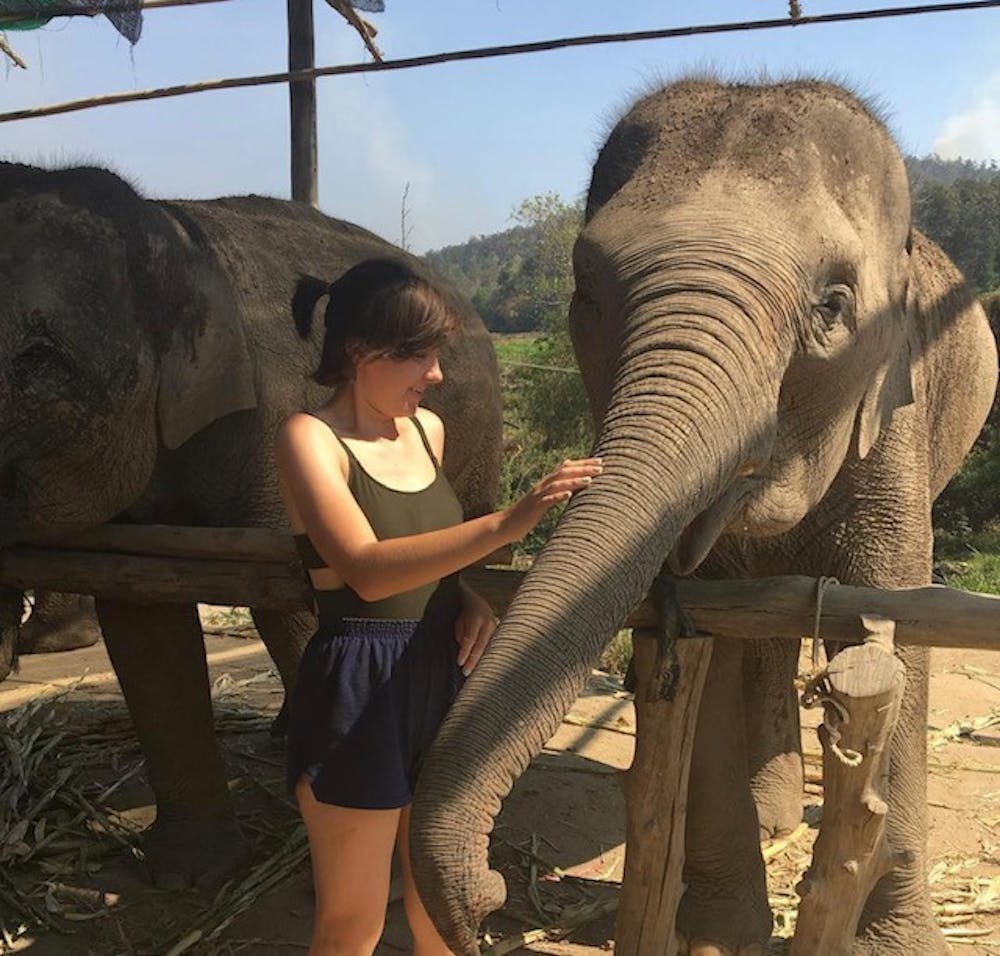Q&A: CMU Alumna takes on Thailand with a Fulbright scholarship

Katie Pulaski interacts with elephants at the Elephant Jungle Paradise Park in Chiang Mai, Thailand in 2019.
Courtesy Photo
After a year-long application process, 22-year-old Katie Pulaski received a scholarship from the Fulbright Program, the largest international exchange program in the U.S.
Pulaski Graduated from Central Michigan University in 2021 – studying anthropology and public and nonprofit administration. After her previous experience studying abroad in Thailand, Pulaski knew her cultural exchanges wouldn’t stop there.
“Traveling abroad really opened my eyes to how big the world was; how much I didn't understand and how much I really wanted to understand and promote understanding,” Pulaski said.
The Fulbright program provides opportunities for American students to pursue cultural exchanges in more than 155 countries, and it is taking Pulaski back to Thailand.
Central Michigan Life talked to Pulaski about this opportunity.
Why were you selected for the Fulbright scholarship? What made you want to apply?
A big thing is that I really want to focus on Thai culture and Thai language because that's on my career path. I'd been there before, I had a teaching experience there before because I volunteered to teach at a nearby monastery, which was a really wonderful experience. It helped that I had experience in the country, that I wanted to go back and that I wanted to continue building relationships and creating a foundation there.
Studying abroad originally in Thailand. I knew that I wanted to go back and that I'd love to stay for a long period of time. I really enjoyed traveling when I was in high school, too.
What was the application process like?
Dr. [Maureen] Harke was really great, and would meet with us over WebEx to go over our essays. We went through quite a few drafts before we turned them in. Then I did an interview with a Fulbright board, which was made up of representatives from Central. They also gave me advice and tips on how to update and change my essays before I did the final application.
Tell us more about what you will be doing in Thailand?
I will be teaching in Thailand. I would be teaching English as a secondary language, but it does provide the opportunity to also interact and immerse myself in the culture, which is really what I'm interested in doing.
Talk about your past expiriences in Thailand?
It was amazing, I really enjoyed it. I stayed in Chiang Mai, which is in northern Thailand. It was one of the bigger cities that I could have gone to, and everyone was very kind. I found that I was able to make friends with university students, because we attended Chiang Mai University. So Thai students would go there, but they also had the USAC exchange program. Everyone was very kind and always willing to take you to see places to teach you about their culture and language, which was really nice, because that's what I'm interested in.
Will you learn to speak Thai?
I've been taking tutoring lessons with my old advisor who was part of the program. I'm trying to learn more before I go, because I know it'll help in the classroom. If I want to do ethnographic research there, I definitely need to know the language.
How is the COVID-19 pandemic affecting your travel to and from Thailand?
My original start date was September 23. Then they pushed it back two weeks, and then they pushed it back three months. I received an email saying that my program had been delayed and I won't be leaving until December 3 now. They raised it to a level 4, meaning that COVID is pretty bad there right now. Currently, all schools are online, but in some of the areas that we will be teaching, the students don't really have access to computers or technology to be able to do extensive online school. Originally, I was going to be there for a year, but with the delay, they've cut the program down to 10 months.
Are you worried about keeping in touch with your family while in Thailand?
With the travel restrictions, I would love to have my friends and family come and visit, but I don't know how much of a realistic thing that will be. When I traveled before we would video chat a lot. Depending on whether we're doing daylight savings, it is an 11 to 12-hour difference. So I have to get up early for a 6 a.m. call versus a 6 p.m. call for them, and that's not too bad to handle.
What have been the most rewarding and difficult moments of your journey so far?
So far it has been receiving the [Fulbright] award. It's such an honor. I'm incredibly excited to also get in the classroom and work with students. I know that won't be easy, but I'm very excited to push myself to learn Thai and to be uncomfortable. Navigating a foreign environment is really exhausting, but I can't wait to meet my students, make those connections and really figure out if it's the right place for me to continue to potentially do research.
It's hard to say (the most difficult moment) because I know it really hasn't started. I think the waiting and the fear of the unknown would probably be the hardest part, at least right now. I'm sure during the application phase, I would have said doing the application because that's also incredibly stressful.
What’s next for your academic acheivments?
I want to go to grad school, and with these extra months that I have before I leave, I'm going to start the application process. So that's pretty much my plan right now. I also really enjoy working in the nonprofit sector, I would like to get more experience there. So working with refugee populations, or with individuals with different cultural backgrounds is my interest within the nonprofit sector.






